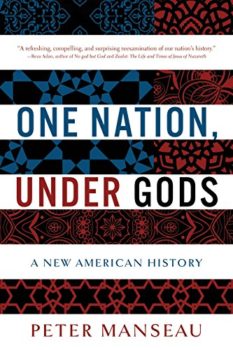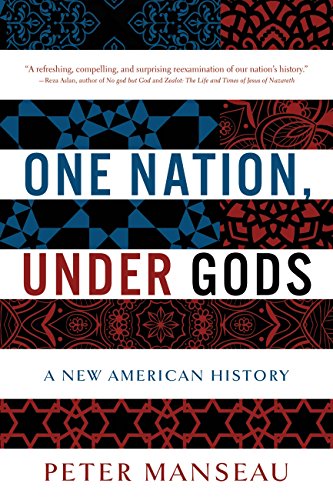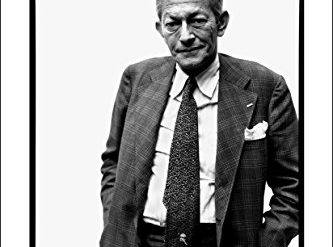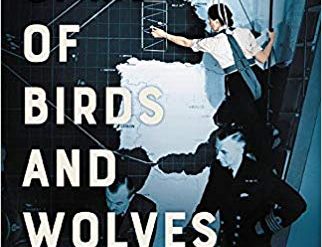
If you’ve wondered how anyone could insist that the United States is a “Christian nation” when so many other faiths are practiced within our borders—and so many Americans shun religion entirely—you should enjoy One Nation Under Gods: A New American History by Peter Manseau. In fact, if you yourself believe that claim, it’s even more important that you read this surprising and revealing book. One Nation Under Gods is an ideal companion volume to Howard Zinn’s classic secular history, A People’s History of the United States. Together, the two books provide a well-rounded picture of American history as it really happened, not as we were taught it in high school.
And the perspective advanced in One Nation, Under Gods is mirrored in the news: “Last week, in a report entitled America’s Changing Religious Identity, the nonpartisan research organization Public Religion Research Institute (PRRI) concluded that white Christians were now a minority in the US population. Soon, white people as a whole will be, too.”
One Nation Under Gods: A New American History by Peter Manseau (2015) 453 pages ★★★★★
Surprises galore in America’s religious history
In One Nation Under Gods, Manseau surveys the country’s religious history from the arrival of the Conquistadores and the Puritans to Scientology, the Right-Wing evangelicals, and New Age cults of recent years. To illustrate each of the major belief systems that have flourished (and sometimes faded away) over the centuries, Manseau offers a lively sketch of each faith’s earliest practitioner, or in cases such as the Mormon Church, the founder.
One Nation Under Gods is full of surprises.
- For instance, did you know that a North African Muslim explored large swaths of what is today the United States nearly a century before the fabled landing at Plymouth Rock—and did so far more extensively than his Spanish Christian masters?
- That twenty percent of the African slaves brought to America were Muslims?
- That the theology espoused by Joseph Smith, founder of the Church of Latter-Day Saints, was derived in significant part from the oracular vision of an Iroquois leader named Handsome Lake?
- That many of America’s leading intellectuals of the nineteenth century—Emerson, Longfellow, Thoreau, Melville, Whitman—were heavily influenced by a traveling Hindu lecturer and the sacred writing of the Hindu faith?
- Or that the first woman prosecuted as a witch in Salem was a Caribbean Indian woman named Tituba whose practice of her traditional religion induced two young girls in a preacher’s household to imitate her “heathen” practices? (Tituba escaped the gallows. The two girls didn’t.)
I certainly knew none of these things. And these examples merely scratch the surface of the revelations in Manseau’s delightful book. I suspect you’ll learn a lot, too.
Religious intolerance in American history
The central theme in One Nation Under Gods is the extraordinary diversity of religious beliefs that have captivated Americans over the centuries. Manseau provides abundant evidence that religious diversity was a reality from the earliest days of English settlement in America, giving the lie to the rigid conformity demanded by Puritan preachers in seventeenth-century New England. Names familiar to any religious scholar—Anne Hutchison and Roger Williams, for example—represented only an early stage in the splintering of the Puritan faith. As settlement moved further into the wilderness, more and more distant from the churches of the towns, the lure of Christian faith grew ever dimmer.
However, it might as well be said that the book is a study of religious intolerance in our history. From John Winthrop’s “city on a hill” to the Chinese Exclusion Act of 1882 and the internment of Japanese-Americans during World War II, the leaders of whichever version of the Christian faith held sway at any one time went to great lengths to stamp out competing belief systems. (Manseau demonstrates that both anti-Chinese and anti-Japanese anger was based at least in large part on intolerance of the Buddhist religion.) The dogmatism of today’s Right-Wing evangelicals who demand “prayer in the schools” is only one manifestation of this history.
About the author
Peter Manseau is the religion curator at the Smithsonian Institution’s Museum of American History in Washington, DC. One Nation Under Gods is his fourth book.
For related reading
You might also enjoy my reviews of two books about Scientology. One is at Scientology revealed in a definitive investigative report. The other: Inside Scientology: set up your own religion, and make a billion dollars. I also reviewed another excellent book of religious history in America: Joseph Smith: the remarkable man who founded the Mormon Church.
You may enjoy browsing through 20 top nonfiction books about history.
For more good books on the history of the US, see Top 20 popular books for understanding American history.
Check out Top 10 nonfiction books about politics for more good reading.
And you can always find my most popular reviews, and the most recent ones, on the Home Page.



























